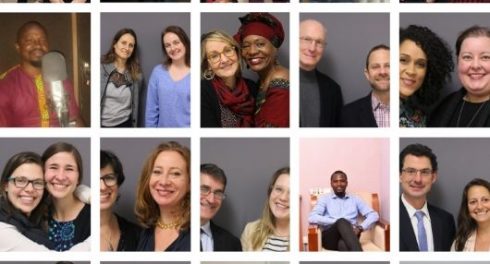
Photo: Unsplash
TAI spotlight
- Learn with Us About Transparency, Participation, and Accountability | William + Flora Hewlett Foundation seeks feedback on its new sub-strategy on learning what works in the TAP field.
- How Can Civic Technology Help Transform Brazil? | Omidyar Network – Felipe Estefan writes about ON grantee Nossas’ experience in providing digital mobilization tools to communities
- Q&A with Kelly Born: Getting Beyond Disinformation | William + Flora Hewlett Foundation – Madison Initiative’s Kelly Born on online platforms and political polarization and the need for more transparency in campaign finance.
- Building Central and Eastern Europe’s Civic Tech Ecosystem | Omidyar Network – An informative read on why Omidyar Network is investing in civic technology in Central and Eastern Europe
- Interview on OpenLandContracts.org – Check out this interview with TAI’s Michael Jarvis on transparency in large-scale, land-based investments
- TAI Report | Distract, Divide, Detach: Using Transparency and Accountability to Justify the Regulation of CSOs – Download TAI’s latest report on weaponizing transparency to close down civic space

In case you missed it…
December 9 was International Anti-Corruption Day (IACD), highlighting the negative impact of corruption on development, peace, and stability. Are we winning against corruption? 2017 was a mixed year according to the 2017 Index of Public Integrity (perhaps an overly polite way to say it.) Minor progress in reducing red tape and increasing demand for good governance, but a push back on press freedom and trade. Certainly some worrying signs in Ukraine – always intriguing when the World Bank and IMF are raising alarm bells on weakening anti-corruption institutions.
So how did the world “celebrate” Anti-Corruption Day? Apparently, this year’s theme was “United against corruption for development, peace and security,” so UNODC and UNDP are featuring a joint global campaign, focusing on how corruption affects education, health, justice, democracy, prosperity and development. One example is corruption in clinical trials such as featured in the class action suit filed against pharmaceutical giant Sanofi Pasteur in the Philippines relating to a dengue vaccine affecting 730,000 children.
Timed to IACD, the US and the UK hosted the Global Forum on Asset Recovery towards global collaboration on criminal prosecution and stolen asset recovery. TAI attended the CSO debrief where groups were glad that CSO inclusion in asset recovery made it into the agreed principles in the official communique, although offering their own take on strengthening accountability of recovery processes.
As Argentina takes over the G20 presidency from Germany, Transparency International issued a call to place anti-corruption at the core of G20’s infrastructure investment agenda. The call made specific demands for clean and open contracting, beneficial ownership public registers and strengthened civic engagement. Check out the Clean Contracting Manifesto to learn more.
Can technology improve transparency and efficiency of public procurement systems? Chris Smith, reflecting from the Open Contracting global summit, believes so, but acknowledges it is not without challenges. Is social media the savior for promoting accountability? Oludotun Babayemi says no – let’s not forget the power of radio.
And for some positive updates – in Nigeria, anti-corruption clubs were launched in secondary schools. Calls were also made to leverage on smart technology as a tool to prevent corrupt practices, resonating with the EU Council’s conclusions on Digital for Development(D4D) framework which stress digitalization as a way to enhance transparency, reduce corruption, improve service delivery, and strengthen civic participation. Meanwhile, two members of the House of Delegates are set to challenge the US state of Virginia’s restrictive FOI statute (with 150 exemptions barring release of information), to make it easier to access public records. And in Nepal, the hunt is on for the country’s most honest government official.
Does the private sector play a role in anti-corruption? In Africa, the business sector is “relatively silent” in spite of the effects of corruption. Tahiru Azaaviele Liedong argues that businesses are silent because they benefit from corruption, fear losing business opportunities, or managers feel powerless against a corrupt system. How to change the dynamic? Catch them young – more investment in ethical business leadership in business schools.
Do cities play a role in anti-corruption too? At the OGP Americas Regional Meeting, participants agreed that cities are uniquely positioned for social good through open government. The same questions remain, however – how to encourage citizen uptake? How do you shift from supply to meaningful data-driven impact? How do you measure citizen engagement? Georgetown University and the Beeck Center for Social Impact + Innovation try to offer some answers on decreasing the costs and risks to accelerate the sharing of data for the common good.
New Zealand is consistently ranked as having low levels of corruption, but a good reputation brings risks of its own. TI NZ chair Suzanne Snively says it makes the country a tempting target for illicit financial flows. The proposed solution? Public register of foreign ownership. TAI donors are thinking about beneficial ownership globally, so intriguing to read Victor Bwire thoughts on Kenya’s beneficial ownership law and worries that the Register of Companies will not be the fully functional unit it needs to be.
What about ensuring better resource governance? Check out this interview with Daniel Kaufmann of NRGI. And even more broadly, is it possible to extend transparency to our own day to day working and lives? Explore the TED radio hour on transparency to find out. You might also want to take a step back in history and learn how the norm of treaty publications has evolved over time.
Saul Mullard makes the case for integrating civic engagement with anti-corruption work, but what are the key issues emerging in civic space as democratic processes go online? As more and more politicians and government institutions rely on Facebook and Twitter to communicate with their constituents, a key question emerges – is social media a public space? Kalev Leetaru explores the implications. A US District Court ruled that it is – “When one creates a Facebook page, one generally opens a digital space for the exchange of ideas and information”. In the US, ProPublica documented the blocking of 1,300 Facebook and Twitter accounts by governors and federal agencies. John Gaventa however also raised another important point – that “digital technologies have created winners and losers, rather than a level playing field”. According to Gaventa, misinformation, shrinking space and the digital divide bring to the surface the limits of technology, and that “politics and power still matter” along with traditional efforts towards transformative change.
Another online threat to civic space? Spyware. An investigation by Citizen Lab found the Ethiopian government involved in a global espionage via spyware, and brings to light the accountability of spyware developers in human rights abuse. Don’t forget the risks of algorithms being used to make decisions impinging on your lives – perhaps the accountability dimensions not adequately to the fore at the big shindig of artificial intelligence proponents.
Is philanthropy finally picking up in China? Shawn Shieh claims there’s progress a year after China passed The Charity Law and the National Charity Information Platform. Two trends are emerging – a growing interest in online fundraising and giving, and internationalization of Chinese philanthropy, with charities and CSR activities in other regions.
What is equitable evaluation? Equitable Evaluation Project seeks to align the principles and practices of evaluation with equity-focused grantmaking. Rapid prototyping and failing fast are increasingly embraced in international development programs. Jean Arkedis of the Transparency for Development project provides concrete examples of “prototyping” in international development, and argues that learning and rigorous evaluation are complementary rather than substitute approaches.
Stumped on how to assess the impact of advocacy and actors on policy and other outcomes? This discussion of methodology and case study examples of contribution analysis might be a helpful read. And if you missed the 2017 Latin American Evidence Week, On Think Tanks shares 10 lessons around producing, communicating, and using evidence. Many of lessons are also relevant for similar data use practices.
We have previously featured Co-Impact, a new form of collaborative. Check out Devex’s in-depth report (quoting the TAI Weekly!) On a final note, as we near the end of the year and naturally look ahead, here’s an interesting read on “the future of everything” – from better condoms to robots handling divorces pro bono, to the future of retail and footwear to making alcohol safer. Lots more reason for us all to follow the adaptive mantra…
Of potential interests…
· Digital Diplomacy – Presentation of Digital Award for Transparency (Paris, 8 December 2017) – The Open Government Partnership and the Ministry for Europe and Foreign Affairs launched a competition on the best anti-corruption digital tools by civil society. Who are the winners?
· Holding Power to Account Through Nonprofit Journalism – Lillian Mongeau of The Hechinger Report talks about the organizations’ work in improving the education system (which includes informing taxpayers about government spending)
· The Oligarchs Strike Back? The Challenge of Anti-Corruption Reform in Ukraine – Check out the video recording of a panel discussion by Hudson Institute on the ongoing challenges of anti-corruption reform in Ukraine
· How Data Is Helping in the Struggle for the Right to Education in South Africa – LRC and CESR talks about the OPERA framework as a tool for collecting, analyzing and presenting data as evidence in litigation towards better education
· Designing the Next OGP Consultation – New Zealand is seeking feedback on how to design its OGP consultation next year
· More and Better Financing for Data to Achieve the SDGs – Jenna Slotin makes the case for why donors must invest in supporting development data
· Government Position on EU Announcement of the List of 17 Non-Cooperative Jurisdictions –Where does South Korea stand?
· Remembering: A Tribute to WHRDs No Longer With Us – The Association for Women’s Rights in Development (AWID) recently released a tribute to remember over 350 Women Human Rights Defenders from 80 countries.
Calls: Proposals, papers and course invites…
- EGAP Learning Days – Deadline: December 15
- UN Grants for Media Projects – Deadline: December 20
- Collaborative Action Research on Citizen Action for Equitable Budgets – Deadline: December 22
- Empowering Data Leaders Through Mentorship – Deadline: December 22
- The Partnerships for Enhanced Engagement in Research (PEER)– Deadline: January 12, 2018
- Advocate Europe – Deadline: January 16, 2018
- Innovations in Participatory Democracy Conference – Deadline: March 8-10 (Phoenix, Arizona, USA
On the calendar
- Global Forum on Asset Recovery– December 4-6 (Washington, DC)
- To Leave No One Behind: Integrating SDG Anti-Corruption Targets In All Other SDGs (webinar) – December 6
- Following the Money: How to Bridge the Gap Between Citizens and Subnational Governments? Emerging Lessons from Guatemala and Mexico – December 6 (Washington, DC)
- Fail Festival – December 7 (Washington, DC)
- TruthBuzz Webinar: Learn How to Make Facts Go Viral – December 7
- The corridors of power – where money meets politics– December 6-7 (Brussels, Belgium)
- International Civil Society Week–December 4-8 (Suva, Fiji )
- Distract, Divide, Detach: Using Transparency and Accountability to Justify Regulation of Civil Society Organizations (also – December 8 (Washington, DC)livestreamed online)
- Natural Resource Wealth and Government Revenue in Africa – December 8 (London)
- Non-state Actors in Governance Systems: Friend or Foe? (streamed live online) – December 13
- Asia Pacific Leaders’ Forum on Open Government – December 14 (Jakarta, Indonesia)
- Closing Civic Space in the Digital Age (webinar)– December 14
- Democracy Defenders in Dialogue – December 14 (Washington, DC)
- Blockchain for International Development (webinar) – January 22 -February 16, 2018
- Data on Purpose: The Promise and Pitfalls of the Connected World – February 15-16, 2018 (Stanford, CA)
- Conference on Fairness, Accountability y– February 23-24, 2018 (New York, USA)and Transparenc
- Open Data Day2018 – March 3, 2018
- Innovations in Participatory Democracy Conference – March 8-10 (Phoenix, Arizona, USA)
- A Return to ‘Governance in Dark Times’? Creating Spaces for Citizen Dialogue, Encouraging Engagement in Public Life, and Ensuring Government Transparency and Accountability – April 12-14, 2018 (Orlando, Florida, USA)
- TicTec 2018: The Impacts of Civic Technology Conference– April 18-19, 2018 (Lisbon, Portugal)
- RightsCon (human rights in the digital age) – May 16 – 18, 2018 (Toronto, Canada)


